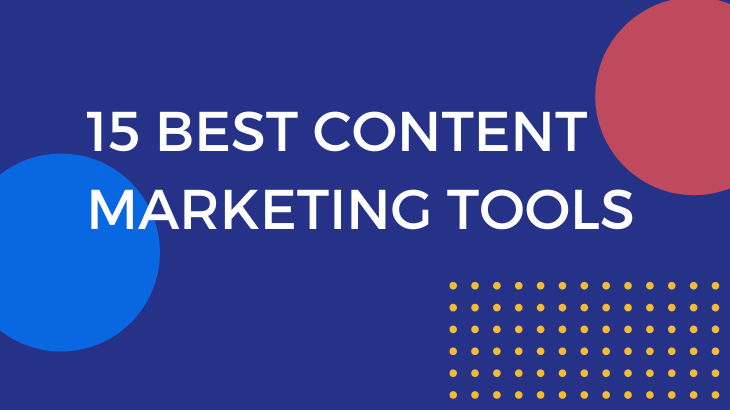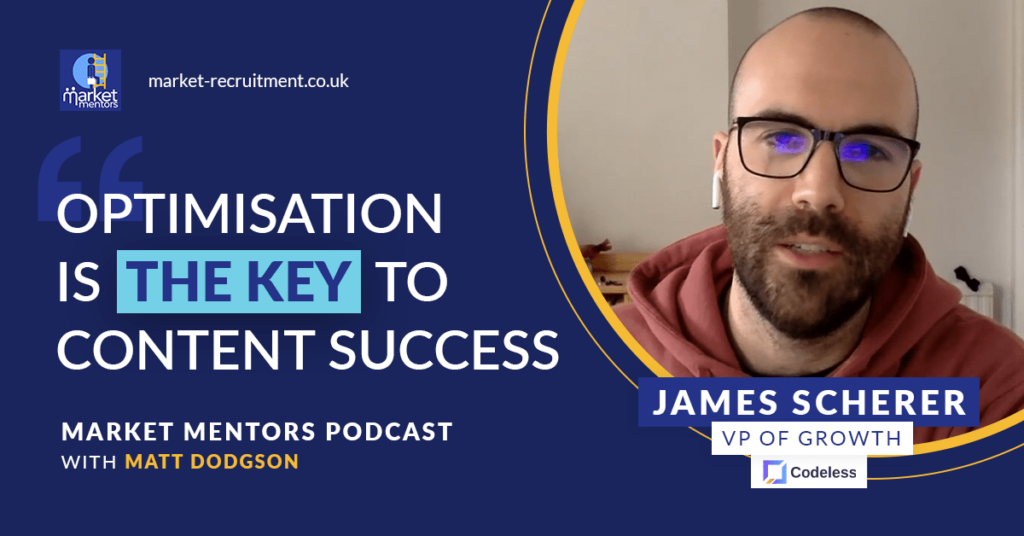
How can you decide on the best content marketing tools to use? With the majority of our work now taking place in a digital context, there’s a vast landscape of helpful content marketing tools and technologies available to choose from.
Digital tools are a great way to save time and improve quality by automating processes, streamlining workflows, and even removing human error. In fast-paced, complex sectors like B2B SaaS, technology is also essential for things like collaboration and project management, and for support in technical areas such as SEO.
But with so many options available, and new software products entering the market all the time, it can be difficult to even know where to begin when selecting the right tech stack for your own team.
Codeless is a content production company that supports fast-growing B2B tech businesses. As VP of Growth at Codeless, James Scherer is responsible for executing content marketing strategies for some of the leading brands in the industry, including notable names such as Monday.com.
James recently shared with us his expert recommendations for the top 15 content marketing tools the team at Codeless uses to manage large-scale projects and deliver content for clients.
Of course, like with most things in marketing, no combination of digital tools will ever be a ‘one size fits all’ solution. These recommendations should be used as a guide, but it’s important to find the best balance for your specific situation and your own unique requirements.
Hiring? Market Recruitment is a specialist content marketing recruitment agency.
ClickUp: This is an intuitive platform that allows you to manage the delivery of your content plan and co-ordinate your team’s workload.
Monday.com: This is another great option for project management and collaboration.
Some other options that might be more suitable for smaller teams with more basic content strategies are:
Bonus Tip: Planning and delivering a content marketing strategy shouldn’t be so complicated that you need highly advanced project management tools. If you’re finding that to be the case, you may benefit from re-thinking your approach and simplifying your processes.
Google Docs: Naturally, a content plan involves a lot of writing, editing, and re-drafting. The advantage of Google Docs over alternatives like Microsoft Office is that it allows multiple people to view, edit, and collaborate on documents simultaneously.
It also allows you to assign specific tasks to people within each document, which is crucial when a team shares different roles and responsibilities at different stages of the production process.
Zoom: Zoom probably needs no introduction these days, as it’s generally considered to be an ideal tool for holding meetings and calls when working remotely.
Loom: Loom is a video platform that allows you to record yourself talking, while including whatever you’re doing on your computer at the time, like a screen-share.
This is very useful if you want to present information or explain something to your team, which they can then watch in their own time and re-watch as necessary. This can be used to present content calendars, talk through individual drafts, or even to deliver performance reports to your team.
Once you’ve generated your topic ideas, and have begun to build out your content plan, you should conduct some SEO keyword research to understand the best keywords and phrases to target.
To do that, some of the best options are:
You can use these tools to see the search volume for your keywords and get your own assessment of intent behind each one.
Bonus Tip: James shared a small hack to use for SEO keyword research. He said, “The easiest way to do that is to find a competitor, see what they’re ranking for, copy their planning sheet over, their ranking position sheet over, and remove stuff that’s irrelevant to you, and then do it better. Of course, there’s a lot more to it than that, but that’s a good start for anyone who is new to this.
Google Docs: As mentioned above, Google Docs is an ideal tool for drafting content and keeping track of all the various steps and iterations within the production process.
Frase: Frase is a content production tool which helps you research, write, and optimise your content to perform well for SEO. It’s also a good tool to check your drafted content against the competition’s SEO performance.
Some good alternatives for this are also:
Writer.com: This is a tool which writers can use to optimise written content for specific purposes, whether that’s to match brand guidelines or boost SEO. For example, you can program your brand-specific style into the tool, which then automates the tailoring of the content to fit within your editorial guidelines.
For more basic writing tools, which provide great support in areas like readability, flow, spelling, and grammar, you can also try:
Interested in learning more about how to plan, execute, and optimise a content marketing strategy that will help you attract more customers and overtake your competitors? Check out our recent podcast episode, where Rand Fishkin gave us a must-see content marketing masterclass that will set you up for success.
AutoCrit: AutoCrit is an anti-plagiarism tool. Not only is this crucial from an ethical perspective, but also because your content can be penalised in terms of SEO if it’s deemed to contain any text plagiarised from other sources.
Bonus Tip: At Codeless, they have a zero-tolerance policy for plagiarism for all their writers. This is generally a good rule to use within any team working on producing and publishing written content.
Grammarly: As touched on above, tools like Grammarly are more suitable for an editor to ensure the quality of the writing is high enough.
This is simply a case of using technology to provide that peace of mind that after proofreading and editing content manually you’re also removing any risk of basic human error.
Ahrefs: As well as the use cases mentioned earlier, this is also a handy tool to track the SEO performance of your content and its placement on search engine results pages (SERPs).
However, James warned that tracking keywords with Ahrefs isn’t as simple as it may seem at first. He provided some extra guidance to help you ensure you’re using the tool correctly and looking for the right things.
James said, “The problem with tracking keywords with Ahrefs is that if you create a content piece, maybe a support piece, and the primary target is ‘project management tools,’ but it ranks for ‘project management software,’ which is a higher volume key phrase, Ahrefs keyword tracker isn’t going to tell you that.”
Site Explorer: To solve the above issue, use this tool to give yourself an in-depth look at the organic search traffic of web pages just by entering their URL. Not only does this allow you to measure performance, but it also helps you identify opportunities for optimisation.
Bonus tip: When measuring your content’s ranking for SEO keywords, if it plateaus on a certain SERP or isn’t performing well enough, it’s important to optimise it further.
In a long-term content strategy, optimising your existing content to rank higher is often a better use of your time than creating new content for the same keywords.
—–
Using this list of recommended tools as a guide to help you enhance and automate your own content marketing strategy will provide you with a wealth of advantages.
Leveraging the right technology to augment your workflows will ultimately boost your speed, efficiency, and accuracy, which will all contribute to greater success.
Of course, we’d love to know what content marketing tools you’re already using within your own team.

If you found this list helpful, you can listen to a recent podcast episode with James here. In the episode, he gave us an exclusive insight into how Codeless has driven growth for Monday.com and helped position the brand as a leader in B2B SaaS.
Some highlights of the episode include:
And if you’re interested in learning more about how to build a successful career in content marketing? Check out The Ultimate Guide to Hiring for Content Marketing, for a detailed breakdown of the role and plenty of useful tips.
Subscribe to our fortnightly newsletter to hear about our latest podcasts, blogs, career advice & jobs.